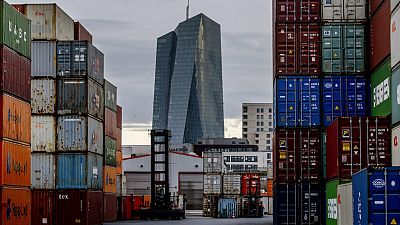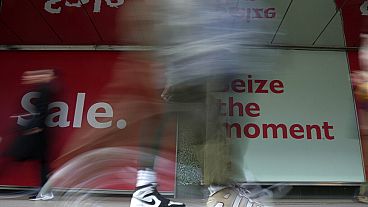By Jonathan Cable
LONDON (Reuters) - Euro zone business growth eased again in September, another sign momentum in the currency bloc is well past its peak although optimism picked up a tad from August's 23-month low, a survey showed on Friday.
While the slowdown was slightly sharper than expected, growth remained robust and firms were able to increase their prices, purchasing managers said, offering some comfort to policymakers at the European Central Bank.
But the surveys highlighted a divergence between services and manufacturing.
The bloc's dominant service industry beat forecasts for no change in the pace of growth from last month. IHS Markit's Euro Zone Services Flash Purchasing Managers' Index (PMI) rose to 54.7 from 54.4. Anything above 50 indicates growth.
Manufacturers however failed to live up to expectations. The factory PMI slumped to a two-year low of 53.3 from 54.6, significantly below all forecasts in a Reuters poll which had a median prediction of 54.4.
An index measuring output, which feeds into a composite PMI, sank to 52.8 from 54.7. It hasn't been lower since May 2016.
"It raises the question how long can you sustain strong service sector growth without a buoyant manufacturing sector, especially when so many services companies are reliant on manufacturers," said Chris Williamson, chief business economist at IHS Markit.
Suggesting little pick-up heading into the fourth quarter, factory new order growth also slowed sharply with the index falling to a 25-month low of 51.4 from 53.0. Exports, which include trade within the bloc, were flat.
"It looks like the export sector is acting as a drag on the economy. You can speculate trade wars and increased risk aversion is creeping in here, there is certainly evidence of that, but it is not clear-cut," Williamson said.
In an escalating trade war, U.S. President Donald Trump on Monday imposed a 10 percent tariff on about $200 billion worth of Chinese imports and threatened duties on around $267 billion more if Beijing retaliates, which it has.
Economists polled by Reuters earlier this month unanimously said the trade war between the United States and China threatens the outlook for the euro zone and that economic growth will be modest at best over the coming year. [ECILT/EU]
Williamson said the composite PMI, which dipped in September to 54.2 from 54.5, below a median forecast in a Reuters poll for 54.4, pointed to GDP increasing 0.5 percent this quarter. The Reuters poll predicted 0.4 percent growth.
A composite future output index, which measures optimism, rose to 61.9 from August's 23-month low of 61.6. But official figures released on Thursday showed consumer confidence fell in September by more than expected.
Services firms increased headcount at the same strong pace as in August. The employment index - which is a lagging indicator - held steady at August's 55.3, a level which had not been seen since October 2007.



